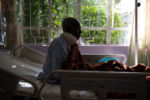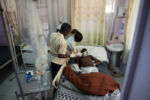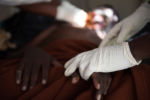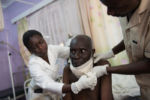Nicholas Pfosi / Tufts University
Summary: Samwell Mosota Omaiyo sits up in his bed on Sunday afternoon at the Texas cancer center in patient facility in Nairobi, Kenya on Sunday, Aug. 23, 2015. He was recently diagnosed with late-stage mandible cancer and is extremely sick. The nurses who take care of him here at the center are trained in palliative care and tend to over a dozen other patients around the clock in this small medical building the outskirts of the city.
Due to a lack of diagnostic technology and a stigma around cancer in kenya patients like Samwell often aren’t diagnosed until their illnesses become terminal.
Here at the center, all the nurses have received specialized training in palliative care and work exclusively with patients who have life-limiting illness. Part of what separates palliative care from other forms of patient care is the holistic approach to treatment. This includes caring for the patient’s emotional and psychological wellbeing as well as their physical needs.
On Wednesday, Aug. 26, 2015, Samwell Mosota Omaiyo passed away due to organ failure early in the evening. He died peacefully.
A palliative care nurse Carren Asembo, attended to him in his final moments and when his wife called to see how her husband was improving after a particularly lucid visit earlier that day, she had the responsibility of informing his wife of Samwell’s death. When asked about how she felt following his loss she said, “Nursing is not a job, it’s a calling. Those who can’t adjust and handle caring for others come, but they soon leave.”









